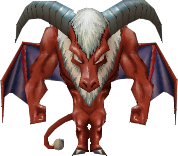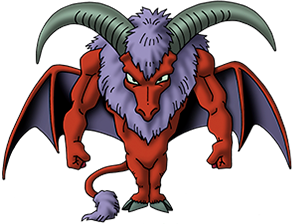Samigina: Difference between revisions
Topaz Light (talk | contribs) m (Typo correction.) |
No edit summary |
||
| Line 72: | Line 72: | ||
</gallery></center> | </gallery></center> | ||
[[Category:Goetic demons]] | |||
[[Category:Dragon Quest V enemies]] | [[Category:Dragon Quest V enemies]] | ||
Revision as of 11:06, 5 March 2023
| Dragon Quest monster | |
|---|---|
| Samigina | |
Art by Akira Toriyama | |
| Japanese | メッサーラ |
| Romaji | messāra (Messala) |
| First appearance | Dragon Quest V |
| Old localization | None |
Samigina is a monster that first appeared in Dragon Quest V. It is a stronger, deep-red variant of the Gamigin, though it's not as strong as the Orobas. Unlike both of them, it is a recruitable monster (all versions, DQV).
Appearances
Dragon Quest V: Hand of the Heavenly Bride
| Sprite | HP | MP | Attack | Defense |
 |
99 | 9 | 107 | 67 |
| Agility | Experience | Gold | Tame Rate | |
| 70 | 155 | 50 | 1/32 | |
| Bestiary No. | 104 |
| Spell(s) | Fizzle |
| Skill(s) | Spooky Aura |
| Location(s) | Gotha Path Gotha area Riteof Passage Knightmare Towers |
| Item dropped | Prayer ring1⁄64 |
| Evasion | Frizz resistance * | Sizz resistance * | Fire Breath resistance * |
| 1/64 | 20% | 20% | 20% |
| Bang resistance * | Crack resistance * | Ice Breath resistance * | Woosh resistance * |
| 67% | 67% | 67% | 67% |
| Zap resistance * | Drain Magic resistance * | Whack resistance * | Kamikazee resistance * |
| 20% | 67% | 100% | 0% |
| Poof resistance | Dazzle resistance * | Fizzle resistance | Fuddle resistance |
| 67% | 67% | 20% | 67% |
| Poison resistance * | Snooze resistance * | Stun resistance * | Sap resistance * |
| 67% | 67% | 100% | 20% |
| PS2 model | DS & Mobile sprite |
 |
 |
Dragon Quest X
|
|
This article is a stub. You can help by expanding it. |
Etymology
Samigina is the alternate name of Gamigin, the fourth demonic entity described in the Lesser Key of Solomon. It is a marquis of hell that initially appears as a small horse that transforms into a hoarse-voiced man shortly after being summoned. This name was coined by Alister Crowley for his personal translation.
The etymology of his Japanese name (メッサーラ messāra) is uncertain, but some Japanese fans speculate that it originates from the fictional character in the classic 1959 film Ben-Hur (based on the 1880 novel of the same name from Lew Wallace) known as Messala, which when transliterated into Katakana is the same as this monster's name. Messala is the childhood friend of the main character, Judah Ben-Hur. Messala later betrays Ben-Hur, thereby becoming his arch-rival and the main antagonist in the story.



